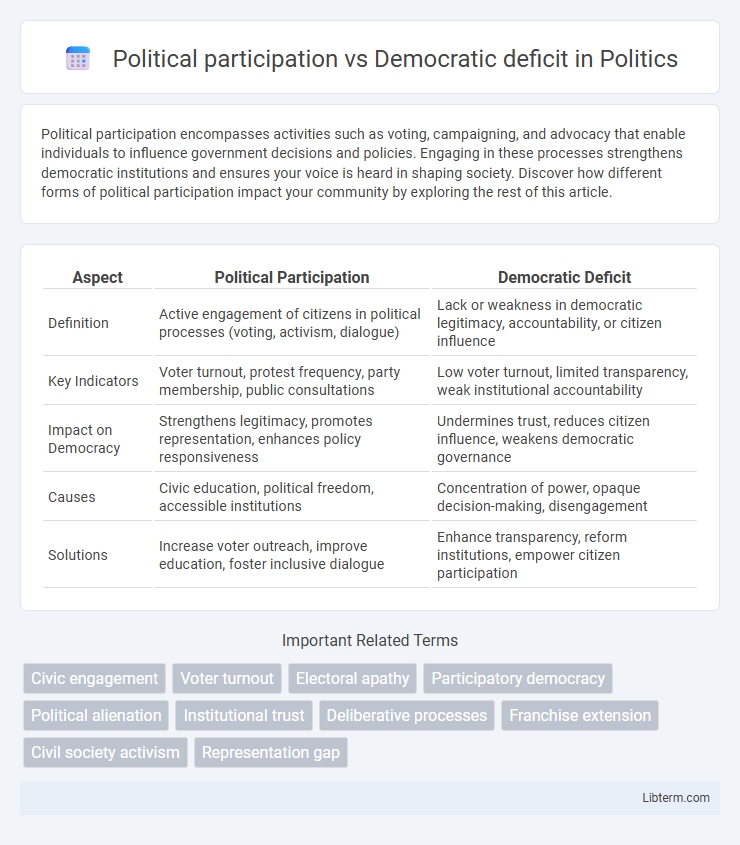Political participation encompasses activities such as voting, campaigning, and advocacy that enable individuals to influence government decisions and policies. Engaging in these processes strengthens democratic institutions and ensures your voice is heard in shaping society. Discover how different forms of political participation impact your community by exploring the rest of this article.
Table of Comparison
| Aspect | Political Participation | Democratic Deficit |
|---|---|---|
| Definition | Active engagement of citizens in political processes (voting, activism, dialogue) | Lack or weakness in democratic legitimacy, accountability, or citizen influence |
| Key Indicators | Voter turnout, protest frequency, party membership, public consultations | Low voter turnout, limited transparency, weak institutional accountability |
| Impact on Democracy | Strengthens legitimacy, promotes representation, enhances policy responsiveness | Undermines trust, reduces citizen influence, weakens democratic governance |
| Causes | Civic education, political freedom, accessible institutions | Concentration of power, opaque decision-making, disengagement |
| Solutions | Increase voter outreach, improve education, foster inclusive dialogue | Enhance transparency, reform institutions, empower citizen participation |
Understanding Political Participation
Political participation encompasses activities like voting, campaigning, and civic engagement that empower citizens to influence governance and policy-making. Low levels of political participation often contribute to a democratic deficit, where elected representatives fail to reflect the public's interests, weakening legitimacy and accountability. Understanding the various forms of political participation is crucial for addressing gaps in democratic representation and fostering a more inclusive political system.
Defining Democratic Deficit
Democratic deficit refers to the gap between the democratic ideals of citizen participation and the actual influence citizens have over political decisions, highlighting a deficiency in political representation. It manifests when electoral systems, political institutions, or governance structures fail to adequately reflect the will of the people, limiting effective political participation. This concept underscores challenges in legitimacy, transparency, and accountability within democratic frameworks.
Historical Context of Political Engagement
Historical political engagement has fluctuated significantly across democratic societies, revealing persistent gaps between citizen involvement and governmental responsiveness. Periods of mass political mobilization, such as the suffrage movements and civil rights campaigns, illustrate peaks in participation that contrast sharply with contemporary trends of voter apathy and disengagement. This historical context highlights the roots of the democratic deficit, where institutional barriers and social inequalities continue to limit effective political participation.
Causes of Declining Voter Turnout
Declining voter turnout, a key cause of democratic deficit, results from political disengagement driven by factors such as lack of trust in political institutions, perceived inefficacy of individual votes, and increasing political polarization. Socioeconomic disparities and limited political education further reduce citizen participation, weakening democratic legitimacy. Digital misinformation and voter suppression tactics also exacerbate the erosion of electoral involvement, undermining representative democracy's foundational principles.
Impact of Democratic Deficit on Governance
Democratic deficit weakens governance by reducing citizens' trust and engagement in political processes, leading to lower voter turnout and diminished accountability of public officials. This erosion of legitimacy hampers effective policy implementation and fosters corruption, as government actions become less transparent and more disconnected from public interests. Consequently, the gap between political participation and democratic responsiveness intensifies, undermining the quality and stability of democratic institutions.
The Role of Civic Education
Civic education plays a crucial role in bridging the gap between political participation and democratic deficit by enhancing citizens' knowledge, skills, and motivation to engage effectively in democratic processes. Studies show that well-designed civic education programs increase voter turnout and encourage active involvement in public decision-making, thereby reducing feelings of political alienation and distrust. Emphasizing critical thinking, rights awareness, and participatory opportunities, civic education strengthens democratic legitimacy and counters the decline in political engagement seen in many contemporary societies.
Barriers to Effective Political Participation
Barriers to effective political participation include socioeconomic inequalities, limited access to education, and restrictive voting laws that disproportionately affect marginalized groups. These obstacles contribute directly to the democratic deficit by reducing citizen engagement and undermining the legitimacy of democratic institutions. Overcoming these barriers requires targeted reforms to increase inclusivity and ensure equitable representation in the political process.
Digital Democracy: Opportunities and Challenges
Digital democracy enhances political participation by providing accessible platforms for voting, public consultations, and civic engagement, broadening the democratic process beyond traditional methods. However, digital democracy also presents challenges such as digital divide, cybersecurity threats, misinformation, and unequal access that can exacerbate the democratic deficit by marginalizing less connected populations. Effective policy frameworks and inclusive digital literacy programs are essential to harness digital tools while mitigating risks to democratic integrity and ensuring equitable citizen participation.
Policy Solutions for Reducing Democratic Deficit
Expanding voter education and facilitating easier access to voting can significantly reduce the democratic deficit by increasing political participation. Implementing participatory budgeting and citizen assemblies encourages direct involvement in decision-making processes, thereby strengthening democratic legitimacy. Enhancing transparency and accountability through digital platforms fosters trust between citizens and governments, mitigating democratic deficits.
Future Prospects for Political Engagement
Expanding digital platforms and social media tools are reshaping political participation by enabling broader citizen engagement and real-time feedback mechanisms, potentially reducing democratic deficits. The rise of e-governance and participatory budgeting initiatives offers tangible opportunities for enhancing transparency and inclusivity in decision-making processes. However, addressing challenges such as digital divides and misinformation remains crucial for ensuring these technologies genuinely strengthen democratic legitimacy.
Political participation Infographic

 libterm.com
libterm.com